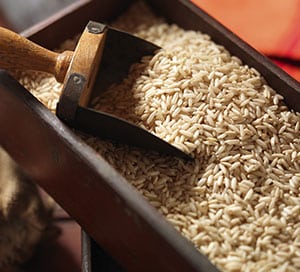By Rocío Río de la Loza, Health Coach
Did you know that by eliminating bread you are not necessarily eliminating gluten from your diet? Gluten is a naturally occurring protein present in wheat, rye, and barley and their derived products. According to the Celiac Disease Foundation, gluten may be found in [1]:
- Whole grain kernels
- Flour
- Cookie dough ice cream
- Breads, cookies, pastries, and other baked goods
- Whiskey, ale, lager, and other type of beers
- Malt extract and malt vinegar
- Brewer´s yeast
- Pasta and noodles
- Dressings, sauces, and gravies
- Snack foods
- Breaded meat, fish or chicken
- Canned soups
- Cold meats and meat substitutes
- Marinades and condiments
- Breakfast cereals, granolas, and energy bars
In addition, there are non-food items that might contain gluten:
- Cosmetics like lipstick
- Medicines
- Vitamins and supplements
- Play-dough
- Communion wafers
The role of gluten in celiac disease:
When a person with celiac disease comes into contact with gluten the immune system responds attacking the small intestine and destroying the villi, little “hairs” responsible for absorbing the nutrients.[2]
Celiac disease cannot be considered simply a food allergy or food intolerance, it is a serious autoimmune disorder that increases the risk of skin conditions, malnutrition, anemia, osteoporosis, chronic fatigue, lactose intolerance, thyroid disease, liver disease, type 1 diabetes, and cancer.[3]
Do you really need to give up bread?
The Celiac Disease Centerfrom the University of Chicago Medicineestimates that celiac disease affects 1% of Americans, which accounts for around 3 million people from the United States.[4]
 To control the symptoms people who have been diagnosed with celiac disease, non-celiac gluten sensitivity, and wheat allergy require removing gluten from their diet, but that doesn´t necessarily mean a grain-free diet. There are plenty of gluten-free grains such as quinoa, rice, and corn, and abundant gluten-free processed foods, including gluten-free bread, that are safe for those who suffer from these health conditions.[5]
To control the symptoms people who have been diagnosed with celiac disease, non-celiac gluten sensitivity, and wheat allergy require removing gluten from their diet, but that doesn´t necessarily mean a grain-free diet. There are plenty of gluten-free grains such as quinoa, rice, and corn, and abundant gluten-free processed foods, including gluten-free bread, that are safe for those who suffer from these health conditions.[5]
Beware of falling into the gluten-free trend! If you haven´t been diagnosed with celiac disease, non-celiac gluten sensitivity or wheat allergy you may continue to consume bread and foods containing gluten.
Bread is good for you:
Bread is a source of complex carbohydrates, providing energy for longer, and dietary fiber, which promotes regular bowel function and feeds beneficial gut microflora.[6] Bread may supply minerals and B-complex vitamins such as folic acid, which prevents neural tube birth-defects.[7] Many kinds of bread made from refined wheat flour, white bread included, have been fortified with iron, calcium, and some vitamins B.[8]
Finally, the American Institute for Cancer Research[9] includes whole wheat bread and whole grains within the AICR’s Foods that Fight Cancer[10] list because according to their findings dietary fiber and phytochemicals in whole grains convey anti-cancer properties.
[1] https://celiac.org/live-gluten-free/glutenfreediet/sources-of-gluten/
[2] https://www.csaceliacs.org/celiac_disease_defined.jsp
[3] http://www.mayoclinic.org/diseases-conditions/celiac-disease/basics/complications/con-20030410
[4] https://www.cureceliacdisease.org/wp-content/uploads/341_CDCFactSheets8_FactsFigures.pdf
[5] https://wholegrainscouncil.org/whole-grains-101/whats-whole-grain-refined-grain/gluten-free-whole-grains
[6] https://www.ncbi.nlm.nih.gov/pmc/articles/PMC5331556/
[7] https://www.cdc.gov/ncbddd/folicacid/documents/factsaboutfolicacid_english.pdf
[8] http://www.cdc.gov/mmwr/preview/mmwrhtml/mm6401a2.htm?s_cid=mm6401a2_w
[9] http://www.aicr.org
[10] http://www.aicr.org/foods-that-fight-cancer/whole-grains.html?referrer=https://www.google.com.mx/?referrer=http://www.aicr.org/foods-that-fight-cancer/whole-grains.html

